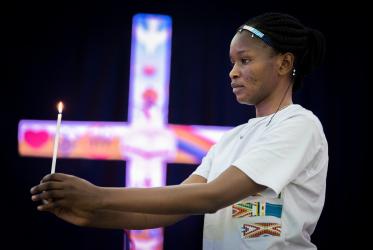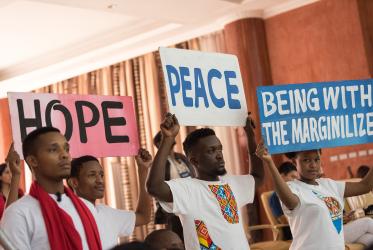In 2018 we celebrate the 70th anniversary of the World Council of Churches. In order to create a lively firsthand account of the ecumenical fellowship and of our shared journey, member churches have contributed stories of people, events, achievements and even failures, all of which have deepened our collective search for Christian unity.
This story was written by Dr Jill Tabart, who was president of the Uniting Church in Australia from 1994 to 1997. Tabart was also consensus mentor for the WCC 9th Assembly in 2006.
Any views or opinions expressed in this article are those of the author, and do not necessarily reflect the policies of the World Council of Churches.
In 2002, a Special Commission on Orthodox Participation in the World Council of Churches (WCC) proposed a change of meeting procedures to consensus decision-making. This was borne out of a growing unease that minority voices were not being heard meaningfully in WCC meetings. Because the Uniting Church in Australia (UCA) had changed its meeting procedures in 1994 from adversarial to a consensus style, I was commissioned by the WCC to write a book [Coming to Consensus: A Case Study for the Churches © WCC Publications 2003] about the journey of the UCA in reaching that decision.
The UCA was formed in 1977 through the union of Reformed and Evangelical denominations (the Congregational Union of Australia, Methodist Church of Australasia, and Presbyterian Church of Australia); by the mid-80s we were determined to find a way of resolving issues which honoured the commitment made to seek the guidance of the Holy Spirit in discerning God’s will for the church.
The legalistic adversarial Standing Orders and Rules of Debate (based on the Westminster parliamentary system, and largely drawn from procedures used in the denominations before Union) increasingly seemed inadequate (and sometimes quite obstructionist) in keeping that commitment.
It was nothing less than a miracle of God’s grace that enabled such a radical change in the young Australian church to be adopted by its 1994 National Assembly, and to help the UCA in following years to model a new way of being in community as God’s people: speakers in councils of the church let go of the ‘my-way-is-the-only-answer, win-at-all-cost’ attitude of former debates; previously silenced voices were able to be included in considering issues; and gradually we discovered how to genuinely listen to each other as together we sought God’s guidance for the way forward for the church in all decisions.
However, a worldwide ecumenical council is a very different parchment on which to paint a new paradigm from that of a small member church of common heritage in one country!
In the biggest challenge of my life, I was invited to be part of the group preparing discernment meeting procedures to introduce to the World Alliance of Reformed Churches (now the World Communion of Reformed Churches) in Ghana in 2004. I subsequently became part of the team working on guidelines for new meeting procedures for the WCC; and was appointed consensus mentor responsible for introducing the new consensus procedures to the WCC 9th Assembly in Porto Alegre, Brazil, in 2006. I continued as consensus mentor with subsequent central committees (and later Rev. Gregor Henderson, another former president of the UCA did also) as this new process of discernment in decision-making became established as the norm for WCC meetings.
Consensus is a process of seeking the common mind of the meeting without resorting to a formal vote, and engaging in genuine dialogue that is respectful, mutually supportive and empowering whilst prayerfully seeking to discern God's will. Because of diverse patterns of meeting procedure used by member churches, commitment to consensus principles in decision-making requires constant attention by the WCC. It’s not a process to be ticked off as being accomplished – it will continue to need careful nurturing and equipping for every new assembly, every freshly appointed Central Committee. The benefits make that intention worthwhile:
- Increased sense of Christian community, as the aim moves from winning an argument with a pre-conceived position, to seeking together to discern God’s will for the churches
- All members enabled to contribute in discernment, whether confident orators or not
- Stronger ownership by the churches of the outcome of decisions
What a wonderful privilege it has been for the UCA to observe the integrity with which the WCC - a diverse ecclesial and inter-cultural body - has adopted a consensus approach to decision-making! And how awesome it is to see a number of WCC member churches decide to engage in the hard work within their own setting, to ensure making decisions for them is based on being in Christian community, not just on accepted secular standards!
May God continue to challenge us in our ways of being church, learning from each other as we listen for the voice of the Holy Spirit to ensure we remain faithful to God’s calling for the church.
Dr Jill Tabart
President, Uniting Church in Australia 1994-1997
WCC 9th Assembly Consensus Mentor 2006
More information about the WCC 70th anniversary
Read more WCC 70th anniversary stories
If you feel inspired to send us your WCC story, too, please be in touch!









